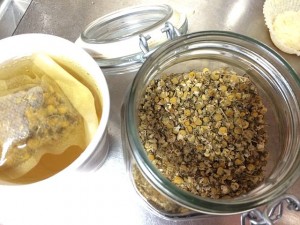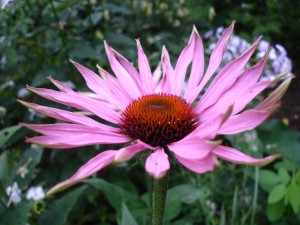Botanical Medicine
Botanical (Herbal) medicine has been used all over the world, and in different ways. In a 2005 CDC survey, 19% of adult Americans take dietary supplements and most use them without medical advice. Because many of your patients may be taking botanicals at home, as a medical practitioner, it is important to at least be familiar with them, and even consider integrating some of them into your practice if appropriate. Here are some botanicals that may have evidence for their use.
Preparation

Infusion/Tisane – steep in hot water for 5-10 min, for flowers, leaves, seeds
Macerate – steep in cold or room temperature water, for plants with volatile oils with compounds that may be destroyed by heat.
Decoction – boiled for hours, particularly for roots, bark and other hard plants.
Tincture – dissolved in alcohol, often at 1kg:5L ratio of herb:solvent
Fluid Extract – dissolved in alcohol, often 1kg:1L ratio of herb:solvent
Poultice – applied to skin, and kept in place with cloth
By Mechanism

Anti-catarrhal – helps with symptoms of common cold, via several different mechanisms.
- Echinacea purpurea (antiviral), Elderberry (antiviral), Ginger (expectorant), Eucalyptus (expectorant)
Anti-Inflammatory – decreases inflammation
- Turmeric, Arnica Montana, Cat’s Claw Bark
Antimicrobials/Antiseptic – mechanisms of action vary
- Oregano (anti-staph and strep), Rosemary (anti-staph and strep), Thyme(anti-staph and strep), Tea tree (anti-fungal), Mint, Myrrh, Echinacea
Antispasmodic – relieve muscle spasms and cramping of GI tract.
- Chamomile, Peppermint, Kava Kava
Astringents (Tannins) – tightens tissue, great to put on wounds, can act as protective barrier in stomach
- Bearberry, Indian gooseberry, Witch hazel bark, Oak bark, Black tea, White oak bark
Bitters – helps with digestion
- Gentian, Centaury, Yarrow, Hops, Wormwood
Carminative – antispasmodics for the gut, alleviates gas, bloating
- Peppermint, fennel, caraway, anise, chamomile
Cholagogue – releases already formed bile from gallbladder
- Peppermint, Turmeric, Gentian, Artichoke, Dandelion
Cholaretic – stimulate bile production from hematocytes, like cholecystokinin or secretin
- Dandelion, Culver’s Root, Horehound
Decongestant – stimulate cold receptors in nose, making you feel relieved from congestion
- Peppermint (menthol), Cinnnamon (camphor), Eucalyptus (cineole)
Demulcent – have water-soluble viscous material. Can be used internally to repair GI mucosa, or externally on wounds or burns.
- Aloe, Licorice, Slippery Elm
Diaphoretics – makes you sweat to help with fever
- Elder flowers, Linden flowers, meadowsweet flowers, ginger, cayenne peppers
Diuretic – increase urine production by increasing blood flow to kidneys (rather than through excretion of electrolytes)
- Hibiscus, Bearberry, Cough Grass, Stinging Nettles, Dandelion Leaf (vs root), Goldenrod, Parsley, Juniper
Expectorant – thins mucus which makes it easier to cough out.
- Garlic, Cinnamon, Cayenne Pepper, Ginger, Eucalyptus, Horehound, Thyme
Hepatic – protects and strengthens liver from damage
- Milk Thistle (has silibinin which protects against hepatotoxins), Schizandra, Globe Artichoke, Dandelion
Hypotensive – decrease BP, peripheral vasodilator
- Garlic, Indian Snakeroot, Hibiscus, Hawthorn, Coleus, Black Haw, American Hellebore
Immune Modulators – boost immune system
- Echinacea, European mistletoe, Astragalus root
Lactagogue – increase secretion of breast milk
- Fennel, Fenugreek, Shatavari Kalpa, Milk Thistle
Nervine Relaxant – has sedative effects
- Chamomile (milder), California Poppy, Lavender , Valerian (stronger), Lemon Balm, Hops, Passion Flower, Linden
Nervine Stimulant – has stimulating effects
- Coffee, Tea, Kola nuts, Guaraná, yerba maté
Nervine Tonic (Adaptogen) – restores strength and vigor
- Milky Oat Seed, Skullcap, St. John’s wort, Panax ginseng, Panax quinquefolius, Rhodiola, Astragalus, Ashwagandha,
Sialogogue – increases saliva, stimulate appetite
- Ginger, Citrus fruits, Bitters
Vulnerary – helps tissue heal, wounds, topically or internally.
- Aloe, Calendula, St. Johns Wort, Comfrey
Commonly Used Botanical Medicines
Black Cohosh – Has modest effect on menopausal symptoms, PMS, dysmenorrhea. Relatively safe.
Blueberry/Bilberry – Dried fruit useful for acute nonspecific diarrhea. Also used to prevent retinopathy and for a varicose veins, but evidence not compelling. Rich in anthocyanins (potent antioxidants).
Chaste Tree – Treats irregular menstrual cycles, PMS, mastodynia. Reduces prolactin by binding D2 receptors. Increases progesterone in luteal phase and binds opiate receptors.
Cranberry – Treats symptomatic UTI. Take 4-6 oz juice BID, or 400-800mg capsule qday.
Devil’s Claw – Arthritis, Acute back pain (equivalent to NSAID), chronic low back pain, acute inflammatory conditions. However, tastes bitter and can cause upset stomach.
Echinacea – Treat Colds. Use tincture (1:5 strength) 3-5cc q3-4h for cold symptoms.
Feverfew – Prevents migraines. Studies show mixed results.
Garlic – Many uses. Reduce risk of GI cancers. Acts as antimicrobial. Lowers cholesterol levels. Weak evidence for lowering blood pressure.
Ginger – Treats nausea/vomiting.
Ginkgo – Used for neuroprotection in dementia. However, studies show it did not delay or prevent dementia more than placebo. Purported to increase bleeding risk but this has not been proven in studies either.
Ginseng – Tonic. Treats mental and physical fatigue. May help smoking cessation.
Goldenseal – Used as antibacterial, antifungal, for gatritis (bactericidal to H. pylori). However, not much studies.
Horse Chestnut – treats venous insufficiency, varicose veins. 300mg BID. Good studies. Safe.
Licorice – Gastroprotectant. Increases prostaglandins that promote mucus secretion and cell proliferation in stomach. Good for coughs, cold, sore throat, GERD, gastritis, IBD. However, contains glycyrrhizin that could cause pseudoaldosteronism when eaten too much, leading to hypertension, edema, hypokalemia. Dose 700-800mg 20 minutes before meal. Do not exceed 3g/day for 3-4 wks.
Milk Thistle – Protects liver against hepatotoxins.
St. John’s Wort – Treats mild to moderate depression. Dose 900-1800mg/day. However it is P450 inducer, and can reduce warfarin, digoxin, cyclosporine, indinavir, irinotecan, oral contraceptives, and other drugs metabolized by P450.
Saw Palmetto – Reduced symptoms of enlarged prostate.
Soy –
Turmeric – Anti-inflammatory. Prevent colon cancer, prostate cancer, skin cancer. Treats IBD, Crohn’s, UC, rheumatic or inflammatory conditions.
Valerian – relaxant. Treats anxiety, insomnia.











